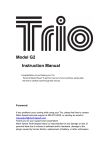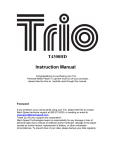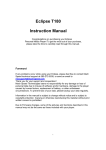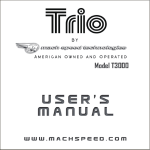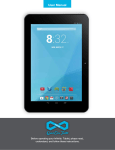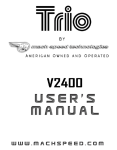Download Mach Speed Technologies TRIO T3010 Specifications
Transcript
Model T3010 Congratulations on purchasing your Trio Personal Media Player! To get the most out of your purchase, please take the time to carefully read through this manual. Foreword If any problems occur during while using your Trio, please feel free to contact Mach Speed Technical Support at 580-272-0035, or sending an email to [email protected]. Thank you for your support and cooperation! Mach Speed Technologies bears no responsibility for any damage or loss of personal data due to misuse of software and/or hardware, damage to the player caused by human factors, replacement of battery, or other unforeseen circumstances. To prevent loss of your data, please backup your data regularly. 1 Information in the manual is subject to change without notice and is subject to copyright protection. Copying or otherwise reproducing this material without prior written consent is prohibited. Due to Firmware changes, some of the pictures and functions described in this manual may not be the same as are included with your player. 2 Note: ● The playback times listed refer to the maximum playback times possible, using the best power savings. The actual playback time may differ as adjustments to screen brightness; power savings modes, volume, etc are made. ● There are many brands of Micro SD cards in market, using different quality and speed standards. Therefore, we are unable to guarantee that our product will be compatible with all types or brands of Micro SD cards, but will be compatible with those Micro SD cards with mainstream specifications in the market, and we will constantly strive to provide the largest selection of cards possible. ● As parameters such as formats, bitrate, codecs, framerates, and resolutions differ, the player We recommend you use the included conversion tool for video conversion. Caution Modifications not approved by the party responsible for compliance could void the user’s authority to operate the equipment. NOTE- This equipment has been tested and found to comply with the limits for Class B Digital device, pursuant to part 15 of the FCC rules. These limits are designed to provide reasonable protection against harmful interference in a residential installation. This equipment generate, uses and can radiate radio frequency energy and, if not installed and used in accordance with the instructions, may cause harmful interference to radio or telephone reception, which can be determined by turning the equipment off and on, the user in encouraged to try to correct the interference by one or more of the following measures: 3 Reorient or relocate the receiving antenna. Increase the separation between the equipment and the receiver Connect the equipment to an outlet on a circuit different from that to which the receiver is connected. Consult the dealer or an experienced radio/TV technician for help. Features: • 3.0 inch Full Color TFT LCD Screen, 400x240 native resolution • Touch Screen Controls • 1.3MP (Interpolated) Digital Video Camera • Plays Music: Supports MP3, WMA (non encrypted DRM), WAV, FLAC, • Plays Video: Supports AVI(SP/ASP), RM, RMVB, WMV(SP/MP), and • Supports JPEG, GIF, PNG, TIF and BMP format image files • Supports ID3 and LRC files • High Speed USB 2.0 Interface • Built in rechargeable battery • Multiple language support OGG, APE, AAC formats FLV video formats 4 Get to Know Your Player Model T3010 Display Screen ON/OFF Made in China USB Power ON/OFF Earphone Micro SD USB Basic Operations Powering on Set the ON/OFF switch to the ON position, and press and hold the seconds. 5 button for 3 Powering off Press and hold the button for 5 seconds, until the player powers off. You can then set the ON/OFF switch to the OFF position Charging the Player To charge your player, set the power switch to the ON position and connect the player to a powered USB port. As a general rule, it will take 2-4 hours to completely charge the battery on the player. File Storage Files of different types should be stored under different directories. For example, music file should be stored under MUSIC dir. Record file stored under RECORD dir. Picture files under PICTURE dir. Video files VIDEO dir. Text files TXT dir. the corresponding application will be unable to access your file If they are not saved in this way. Insert and remove a Micro SD card To insert: with the front (the side with characters) of the Micro SD card up (towards the screen of the player), slightly push to insert into the card holder of the player to connect. After the card is inserted, the player can play the files on the Micro SD card. To remove: Slightly push the card and the Micro SD card will partly be exposed, then pull the card out Note: Please ensure that the power is off when you connect or disconnect your SD 6 card, or damage may occur to the player or your card. Loading Files There are two main methods of loading your files to the player. Using Windows Media player, and copy and pasting the files. Using Windows Media Player (Note: you must use Windows Media Player 10 or later to use this feature.) (Note: this player does not support DRM encrypted audio or video files, such as those downloaded from the Windows Media Player “Overdrive” download service.) 1. Open Windows Media Player and connect the player to a working USB port. Windows Media player will prompt you with a setup screen asking you to name the MP3 player. 7 2. Once you have named your MP3 player, select Finish, and your Windows Media Player will open to the Sync tab. 3. Drag your music to the sync list (on the right of the screen) from the list on the left. Once you have selected the music you wish to add to the player, press Sync. 8 4. Windows Media player will load the songs on to your player. 5. Once all the songs you have added are synced to the unit, and Windows Media Player says that is safe to disconnect your MP3 player, disconnect the device. 9 COPY AND PASTE Note- This alternate method is used to load videos, pictures, and ebook files as well as audio files 1. Connect the MP3 player to a working USB port. 2. When the unit is connected to your computer, it will create a gray and green icon in the system tray (lower right hand corner of your desktop). The icon will be called safely remove hardware. 3. Go to the “My Computer” section of your computer. In there you will find a section called “devices with removable storage” 10 4. Locate the drive created by the unit, generally just called Removable Disk, with a letter in Parenthesis. Drive letters vary depending on your system configuration. 5. Open the drive by either double left clicking on the drive itself, or by right clicking to open the option menu then left click on the desired drive. 6. Locate the music stored on your computer. Generally this is stored in the “My Music” folder of your computer. NOTE: if you are unable to locate the music on your computer, click on start, search, files and folders, then search for “*.MP3, *.WMA”. 11 7. Once you have located the song files, you can right click on the song itself, and select “copy”. Open the removable disk drive, right click on in the empty space, and select Paste. This will transfer the song on to your player. 12 8. Repeat step 7 for as many songs as you want to copy on to the unit. NOTE: MAC Computers When connected to your MAC computer, the device will act as a removable drive. Simply drag your files to the device. Main Menu This player provides a touch screen Operating system for easy operation. The main menu interface is shown in the picture below: 13 Music On the main menu, touch the “Music” icon to enter music mode. When you see a file you would like to listen to, tap that item to begin playing the file. This mode will also allow you to playback your audio books and podcasts. Now playing- Selecting this icon will list all of the files you are playing, or have 14 played this session. Items currently playing will have a speaker icon following it. All Music- List all the music files loaded in the music folder on the player. Artist- Displays a list of Artists, when you select an artist, a list of their files will be displayed. Album- Display a list of albums loaded on the player, once an album is selected a list of files from that album is displayed. Genre- Displays a list of genres loaded on the player; once a genre is selected, a list of files will be displayed. Playlist- Displays your 5 playlists. Files are added to a playlist in the music submenu. Please note that this player will NOT support imported playlist files, such as those from windows media player or iTunes. Directory list- List all audio files in the Music folder. Files are displayed in a 15 standard folder structure Recordings- Displays a list of recorded files. Rating- Allows you to sort by star ratings which you have given your files. Tag- This allows you to return to the “tags” or audio bookmarks you have set on your music files. Search- You can enter the search feature by tapping the search bar in the upper right hand corner of the screen. Back to the main menu. 16 Audio playback Interface: USB Battery Play Time Submenu Back Stars Equalizer Mode Repeat Mode Playing Bar A-B Repeat Volume 17 Music Submenu z z Variable Speed Playback- Allows you to adjust your playback tempo. Add Tag- Allows you to “bookmark” the current spot in this file. You can return tot his spot using the tag option in the Music selection screen. z Delete File- Allows you to delete the current file. z Information- Displays the file’s information z Set Rating- Allows you to rate the current file using stars. z Add to My Playlist- Allows you to add the current file to one of several z User EQ- Allows you to create a customized equalizer setting. z SRS User Mode- Allows you to adjust the special SRS special effects playlists. settings. Photo On the main Menu, touch the “Photo” icon to enter photo mode. 18 Now playing- Selecting this icon will list all of the files you are playing, or have played this session. All Photos- list all the picture files saved in the Photo folder of the device. Flies are displayed in a standard folder structure. Directory List- List all the music files loaded in the music folder on the player structure. Display photos taken using the camera. 19 Layout- Located in the Upper right hand corner, you can use these cons to swap between list, thumbnail, and slideshow view modes while selecting photos. Back Picture submenu Zoom slider 20 Slideshow- Displays your images in a slideshow format. Set Background- Set the current image as your Main Menu’s background. Sizing- when zoomed in, this will allow you to return to a normal ratio. Rotate- Rotate the current image 90 degrees clockwise. Picture submenu • Slide Effect- Set the special effect when sliding from one picture to another • • • Delete- Deletes the current picture file. Information- Displays file information. Screen Size- allows you to display the image in different sizes Video Mode On the main interface, touch the “Video” icon to enter video mode. Please note that this player plays video files in AVI, WMV(non encrypted), FLV,RM,RMVB formats with an optimum resolution of 480x240. When you see a file you wish to view tap that item to begin playback. 21 Now playing- Selecting this icon will list all of the files you are playing, or have played this session. All Music- List all the video files loaded in the Video folder on the player. Directory list- List all video files in the Video folder. Files are displayed in a standard folder structure Tag- This allows you to return to the “tags” or audio bookmarks you have set on 22 your music files. My DV- Displays recordings you have made using the digital video recorder. Video Playback Interface While a video is playing, briefly touch the screen and press any button to bring up the progress bar and file information. This bar will disappear if no icons are touched for 2 seconds. Video Submenu z Playback Mode- Allows you to select Sequential, repeat one, repeat all, or shuffle. z Add Tag- Allows you to “bookmark” the current spot in this file. You can return 23 tot his spot using the tag option in the video selection screen. z Screen Size- Allows you to adjust your video display size, choose from full screen, original size (if smaller than the screen) and a scaled resolution (if larger than the screen) z Resume- Allows you to turn on or off an auto resume feature. When you are viewing a file and you exit video mode, if you return to the video file (and this feature is on) you will resume playback. Camera In the main interface, touch the “Camera” icon to enter camera mode. This will allow you to take pictures. Camera Interface 2 1 7 3 4 24 5 6 1. Briefly Touch the Camera Icon to take pictures. 2. Zoom- Slide this bar to adjust the zoom focus. 3. Self-timer- off, 5 sec, 10 sec, 15 sec, 20 sec. default is off. 4. Brightness- Adjust your brightness 5. Border- Allows you to add or remove one of several special effects borders. 6. Browse- Takes you to picture mode, and allows you to browse pictures you have taken. 7. Swap- Swap between Camera and video recorder mode. Camera Submenu z White Balance- Auto, sunny, cloudy, incandescent, fluorescent. z Exposure Mode- Auto, indoor and outdoor, the default is auto. z Face Detection- On or Off. z Special Effects- Off, black and white, Sepia, negative. Default is off. Video Camera On the main Menu, you can tap the “video Recording” icon, or in Camera mode, tap the “swap” icon to enter video camera mode, which allows you to record videos. Briefly Touch the Record Icon to start recording. 25 1 2 3 1. 4 5 6 6 Record- Begin, or stop recording. 2. Zoom- Allows you to adjust the zoom. 3. Swap- Allows you to swap to your Camera Mode 4. Brightness- Allows you to adjust the image brightness 5. Mode- Allows you to record in Auto, Profile, or Landscape modes. 6. Light- Allows you to adjust for lighting, choose from Auto, Daylight, Cloudy, Inside, or Fluorescent 7. Browse- Takes you to video mode, and allows you to browse videos you have taken. 26 Video Camera Submenu z Special Effects- Off, black and white, Sepia, negative. Default is off. z Save Path- Select where videos you take are saved to. z Resolution- Allows you to set your recording resolutions. Please note that higher resolutions will use more memory z Memory Free Space- Displays the amount of space available z Record Quality- Select from High, Medium, Low, and Auto-adapted z Record Gain- Allows you to adjust the incoming volume for the microphone. PC Camera When the Player is powered on, select PC camera, and connect the device to your computer’s USB port. Your computer will run a setup and install the device as a PC camera, which will allow you to use the device as a webcam. 27 EBook Ebook mode allows you to view your text files loaded on the player. To enter eBook mode, tap the eBook icon on the main menu, and you will enter the ebook selection screen. Select the file you wish to view. When in the eBook mode, slide your finger up or down the screen to “turn the page”. Now Viewing- Selecting this icon will list all of the files you are playing, or have played this session. Directory List- Directory list- List all video files in the Video folder. Files are displayed in a standard folder structure Tag- This allows you to return to the “tags” or bookmarks you have set on your eBook files. 28 Auto Turn/Manual- allows you to swap between automatically “turning the page” and manually “turning the page” Add Tag- Allows you to “bookmark” the current spot in this file. You can return tot his spot using the tag option in the eBook selection screen. Font Size- Allows you to adjust the font size Color- Allows you to change the font and background color. EBook Submenu Select coding- allows you to change your display language. Effects settings- Allows you to set a special effect when the page “turns” in “auto turn” mode. Delete File- Allows you to delete the current file. Recorder To enter the voice recording mode, tap the Recorder icon on the main menu. This 29 mode will allow you to record voice notes. to begin recording. Tap the Stop icon Tap the Play button to stop recording. If you want listen to recordings you have made, you will do so in the Music Mode. Quality- Allows you to adjust the recording quality, select from Low, Medium, and High. Volume- Allows you to adjust the Microphone volume. 30 Recorde Submenu Allows you to set the recording format. z Record format- z Record mode- Allows you to select whether you are recording voice notes, or from the FM tuner (on models with an FM tuner). z Save Path- Allows you to select where to save your audio recordings. Stopwatch This player comes with a simple stopwatch feature. This will allow you to time events. To begin timing an event, tap the Start Icon. You can save this event and continue Timing by tapping the Lap icon, or stop timing by tapping the stop icon. To reset the device and remove saved laps, tap the reset icon. 31 Calculator This player comes equipped with a standard calculator. Tap the icons on the screen to perform your calculations. Browser The Browser allows you to view all files saved to your player, in a standard folder structure. If you select a file, the Trio will automatically enter the correct mode and begin playing that file. 32 Settings The system settings menu allows you to adjust most facets of your player. Whether the desktop picture, screen brightness, system time, or power savings settings, it’s all found here. 33 Display- Adjust your display settings, including brightness, and the backlightlight time. CalibrateNOTE- IF YOU MISCALIBRATE THE SCREEN, YOUR TOUCHSCREEN CONTROLS WILL BE DEACTIVATED. USE WITH CAUTION. If your touch screen is not responding well, use this mode to recalibrate the screen. Off time- You can set this option to power the player off when the player is idle. Date & time- Allows you to adjust the date or time. Language- This will allow you to change the display language. Tap the language 34 you want displayed. Setup sound- You can set this to make a noise whenever you tap an icon on the screen. Set as Desktop-This allows you to select one of different images you have saved on the player as your desktop. Tap the desktop you want to have. If you don’t like any of them, you can set your own. Advanced- Settings recommended for advanced users only. 35 Model V2





































